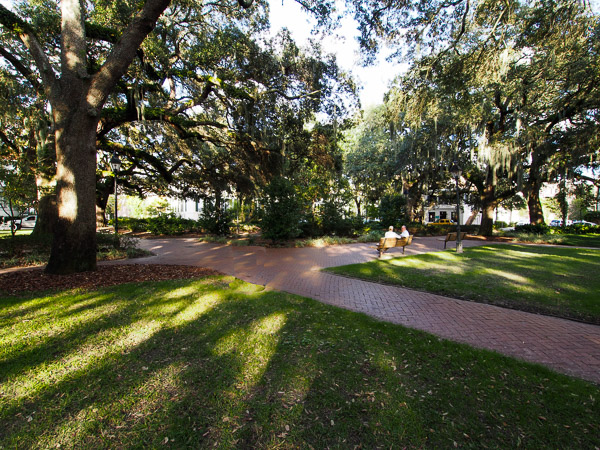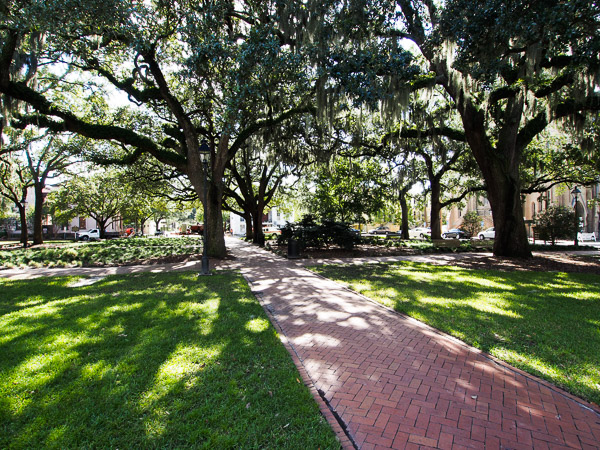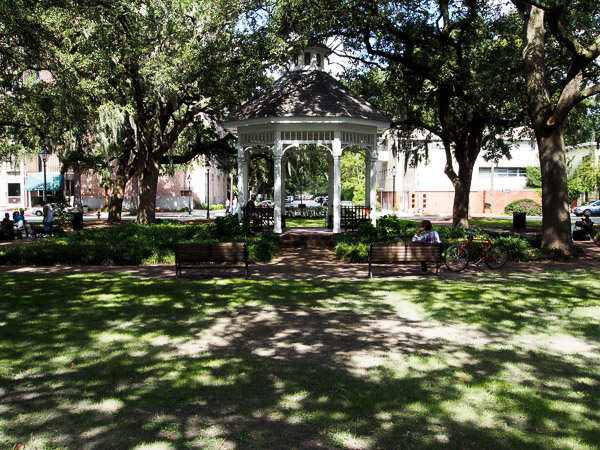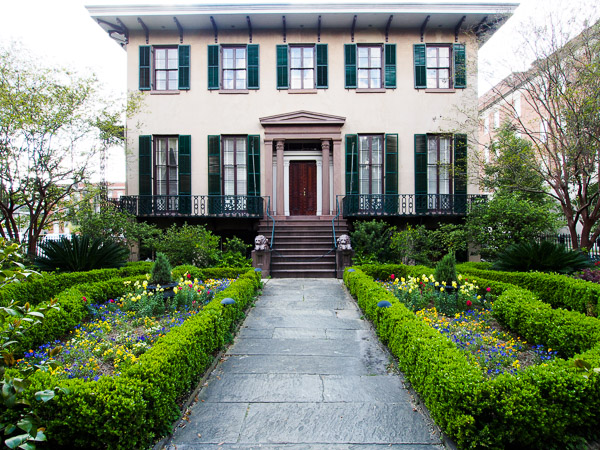 Andrew Low House
Andrew Low House
Andrew Low House
 Andrew Low House
Andrew Low House
Andrew Low House
Savannah, GA 31401
Tours:
Monday - Saturday: 10:00a - 4:00p
Sunday: 12:00p - 4:00p
Tours are on the hour and half-hour daily and the last tour is at 4:00p
The Andrew Low House combines Grecian details with elements of the Italian Villa style and has one of Savannah's most stunning ironwork balconies. A shuttered piazza overlooks a beautiful brick-walled garden in the rear of the home. The front garden has two hourglass-shaped flowerbeds and looks much as it did when first planted. The Andrew Low House features spacious rooms decorated with beautiful plaster cornices and carved woodwork.
]]>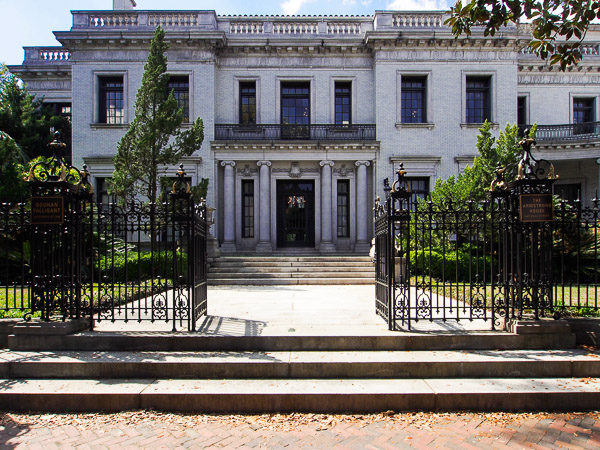 Armstrong Mansion
Armstrong Mansion
Armstrong Mansion
 Armstrong Mansion
Armstrong Mansion
Armstrong Mansion
Savannah, GA 31401
Not open to the public
The Armstrong Mansion is an expansive granite and glazed-brick mansion which exemplifies Italian renaissance architectural style. It was built between 1916 and 1919. It was owned by George Ferguson Armstrong who was a successful Savannah shipping businessman.
]]> Bonaventure Cemetery
Bonaventure Cemetery
Bonaventure Cemetery
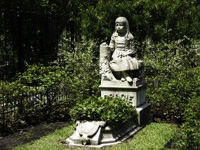 Bonaventure Cemetery
Bonaventure Cemetery
Bonaventure Cemetery
Thunderbolt, GA 31404
Hours:
8:00a - 5:00p
Bonaventure Cemetery lies along the Wilmington River, a short distance from Savannah's "historic district. Settled by Colonel Mylryne about 1760, he built a red brick plantation house on the land and named the place Bonaventure, which means "good fortune" in French. The plantation was the site for Mary's (Mulryne's daughter) wedding to Josiah Tattnall in 1761. The property was seized during the Revolutionary War after Mulryne and Tattnell declared themselves Loyalists and left for England. Tattnall's son returned after the war and purchased the home from James Habersham. The property remained in the hands of the family until 1840 when it was sold to Captain Peter Wilberger, owner of the Pulaski house for use as a cemetery. The city of Savannah purchased the cemetery in 1907.
]]>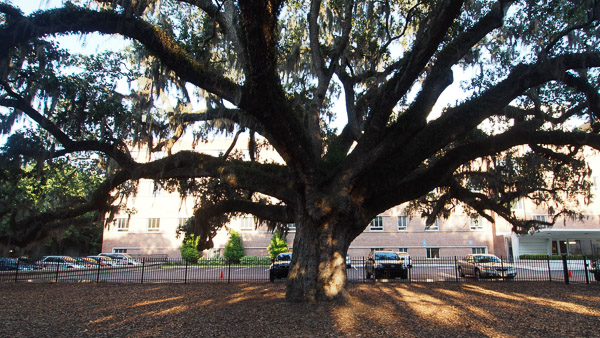 300 Year Old Candler Oak Tree
300 Year Old Candler Oak Tree
Candler Oak 300 Year Old Tree
South of the corner of Drayton and East Gaston Streets
The Candler Oak stands just south of the corner of Drayton and East Gaston Streets, and is estimated to be about 300 years old. It is 54 feet tall, has a circumference of 16.85 feet and a 63 inch diameter. Its average crown spread is 110.25 feet.
]]>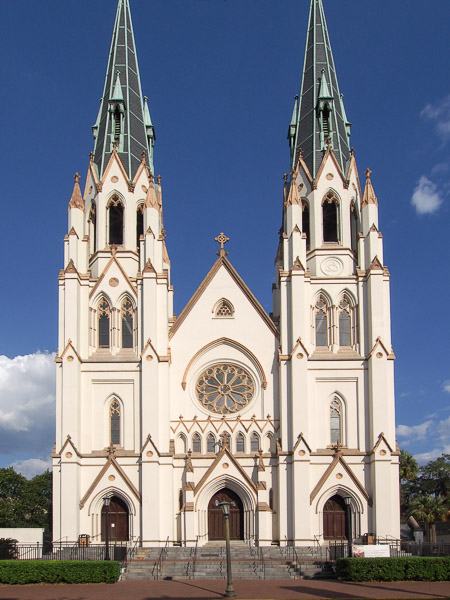
Cathedral of St. John the Baptist
Cathedral of St. John the Baptist
 Cathedral of St. John the Baptist
Cathedral of St. John the Baptist
Cathedral of St. John the Baptist
Savannah, GA 31401
Hours: Open to the public
Monday - Saturday 9:00a - 5:00p
The Cathedral of St. John the Baptist is one of the most awe-inspiring buildings in all of historic Savannah Georgia. It is also one of the most popular tourist attractions in all of Savannah.
The Cathedral of St. John the Baptist is a beautiful French Gothic cathedral, certainly one of the most amazing cathedrals in the south. It is the Mother Church for the Roman Catholic Diocese in Savannah.
{jssocials}]]>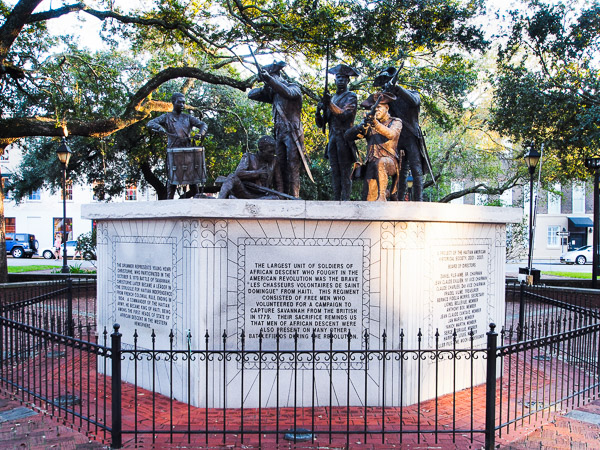 Chasseurs volontaires de Saint-Domingue
Chasseurs volontaires de Saint-Domingue
Chasseurs volontaires de Saint-Domingue
 Chasseurs volontaires de Saint-Domingue
Chasseurs volontaires de Saint-Domingue
Chasseurs volontaires de Saint-Domingue
Savannah, GA 31401
Chasseurs-Volontaires de Saint-Domingue Monument is a memorial honoring Haitian Volunteers who fought with Pulaski during the Siege of Savannah in 1779.
Chasseurs-Volontaires de Saint-Domingue was a group of white colonists and 800 native riflemen and slaves, from French colonial Saint-Domingue (present day Haiti), who participated in the War of American Independence in Savannah, Georgia.
Chatham Square to Whitefield Square
(4 Squares)
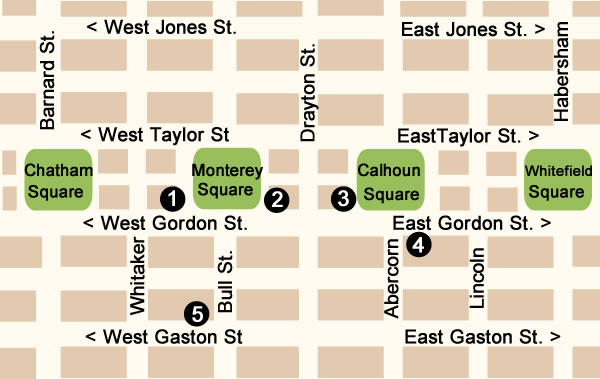
W. Taylor and E. Taylor Street (4 Squares):
Points of Interest:
Chatham Square
- Gordon Row - Series of 15 four story homes in a row
- Barnard Street School - 212 West Taylor Street
Monterey Square *****
 Mercer Williams House - Monday - Saturday 10:30a - 3:40p | Sun 12:30p - 4:00p
Mercer Williams House - Monday - Saturday 10:30a - 3:40p | Sun 12:30p - 4:00p
 Temple Mickve Israel - Monday - Friday, 10:00a -12:00p | 2:00p - 4:00p
Temple Mickve Israel - Monday - Friday, 10:00a -12:00p | 2:00p - 4:00p
Closed on Jewish and federal holidays.
The tour lasts thirty to forty-five minutes.
- Monument to Brigadier General Kazimierz Pulaski - Center of Monterey Square
Calhoun Square
 Wesley Monumental United Methodist Church
Wesley Monumental United Methodist Church
Tours Every Friday at 10:00a (Tour is 1 hour)
 Massie Hertiage Center - Hours: Monday - Saturday 10:00a - 4:00p | Sunday 12:00p - 4:00p
Massie Hertiage Center - Hours: Monday - Saturday 10:00a - 4:00p | Sunday 12:00p - 4:00p
Whitefield Square
- First Congregational Church - 421 Habersham Street
Chatham Square
Points of Interest
- Gordon Row - Series of 15 four story homes in a row
- Barnard Street School - 212 West Taylor Street
Chatham Square was laid out in 1847 and named in 1851 for William Pitt, 1st Earl of Chatham. Chatham Square was one of the last Squares to be built. The square is located on Barnard, between Taylor and Gordon Streets. Chatham Square is a beautiful and peaceful place to relax with the old oak trees giving the square a lot of shade especially on a hot summer day.
There are two buildings of interest at Chatham Square. The first is the Barnard Street School (now owned by SCAD). This historic structure, completed in 1901, is located at 212 West Taylor Street is known for its distinctive Italian tile roof. The Square was used as a playground for the students of the Barnard Street school. The other interest is a set of buildings called Gordon Row. It is a series of 15 four story homes in a row. Today they are used as rental properties.
Monterey Square *****
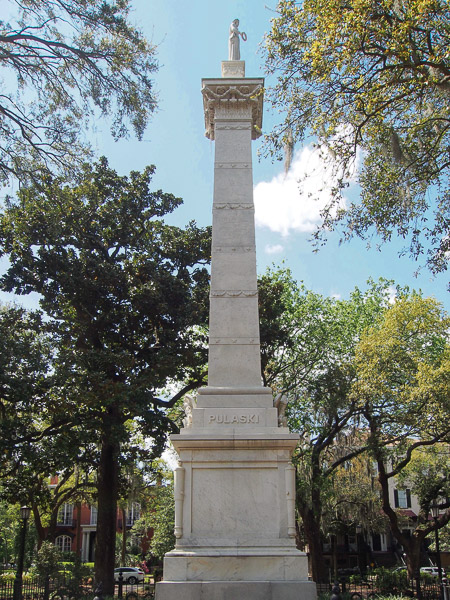
Monument to Brigadier General Kazimierz Pulaski
Points of Interest
 Mercer Williams House - Monday - Saturday: 10:30a - 3:40p | Sunday 12:30p - 4:00p
Mercer Williams House - Monday - Saturday: 10:30a - 3:40p | Sunday 12:30p - 4:00p
 Temple Mickve Israel - Monday - Friday: 10:00a - 4:00p (last tour is at 3:00p)
Temple Mickve Israel - Monday - Friday: 10:00a - 4:00p (last tour is at 3:00p)
Closed on Jewish and federal holidays.
The tour lasts thirty to forty-five minutes.
- Monument to Brigadier General Kazimierz Pulaski - Center of Monterey Square
Monterey Square was laid out in 1847 and was named to commemorate the capture of the city of Monterey, Mexico in 1846. In the center of the square is a monument built to honor General Casimir Pulaski, a Polish nobleman who came to Savannah seeking a better life and sacrificed his life in the Siege of Savannah in 1779.
Directly facing the Monterey Square is the Mercer-Williams house which was featured in the book " Midnight in the Garden of Good and Evil”. The Mercer-Williams House had begun being built around 1860 but was not completed until after the Civil War. The house was finally completed in 1871. It is located at 429 Bull Street.
This square also is home to Congregation Mickve Israel, which is one of the few Gothic-style synagogues in America, dating from 1878.
Monterey Square is located on Bull, between Taylor and Gordon Streets, and is widely considered to be the most picturesque of Savannah's squares. All of the surrounding buildings but one (the United Way Building) are original to the square.
Calhoun Square
Points of Interest
 Wesley Monumental United Methodist Church
Wesley Monumental United Methodist Church
Tours: Every Friday at 10:00a and last 1 hour.
 Massie Hertiage Center
Massie Hertiage Center
Hours: Monday - Saturday 10:00a - 4:00p | Sunday 12:00p - 4:00p
Calhoun Square was named for John C. Calhoun, known as “the Great Orator of the South. This square was laid out in 1851 along Abercorn Street. It is the only square with all of its original buildings intact. It is located on Abercorn, between Taylor and Gordon Streets.
Located on Gordon Street near Calhoun Square is the historic Massie Heritage Interpretation Museum. The school was built in 1856 with funds bequeathed by Peter Massie, to the city, which was used to educate underprivileged children.
Many beautiful homes in the Greek revival style were built around Calhoun square during the early 1800s. The elegant home at 426 Abercorn features a beautiful doorway, high stoop, marble steps and exterior details. Also, notice the wrought iron camellia on the south side of the house.
There are other beautiful homes, townhouses, row houses and the Wesley Monumental United Methodist Church, built in 1868, surrounding this square.
Whitefield Square
Points of Interest
- First Congregational Church - 421 Habersham Street
Whitefield Square was laid out in 1851 and was the final square built. It is named for the Rev. George Whitefield, founder of Bethesda Home for Boys in the 18th century which is still in existence on the south side of the city. Whitefield Square is located on Habersham, between Taylor and Gordon Streets.
Most of the houses around this square were built after the Civil War in the late Victorian or Queen Anne style. A beautiful gazebo stands in the center of the square, keeping with the Victorian “seaside” theme for the neighborhood.
A notable building facing the square is the First Congregational Church.
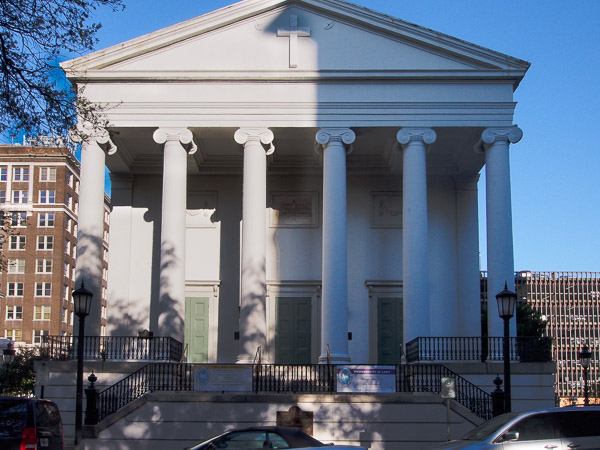 Christ Church
Christ Church
Christ Church
 Christ Church
Christ Church
Christ Church
Savannah, GA 31401
Not open to the public.
The present location for Christ Church was set aside by General James Oglethorpe for the colony's first church. This Greek revival building designed by James Hamilton Couper is the fourth church on the site and dates to 1838. The Corinthian columns and pilasters flank the tall, narrow side windows of this simple but stately building.
]]>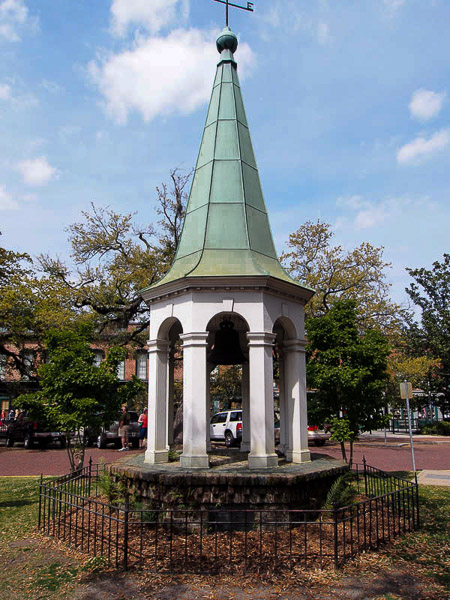 City Exchange Fire Bell Monument
City Exchange Fire Bell Monument
City Exchange Fire Bell Monument
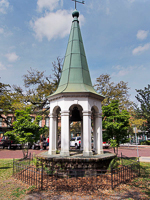 City Exchange Fire Bell Monument
City Exchange Fire Bell Monument
City Exchange Fire Bell Monument
Savannah, GA 31401
The City Exchange Fire Bell hung in the cupola of the City Exchange for 100 years until the building was torn down to make way for City Hall. The bell signaled the closing time for shops, served as a fire alarm, and was often used in celebrations and in tributes for fallen heroes.
]]>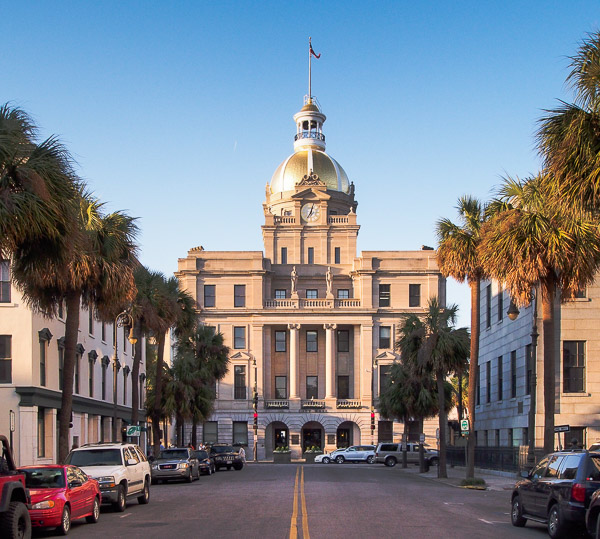 City Hall
City Hall
City Hall
 City Hall
City Hall
City Hall
Savannah, GA 31401
General James Oglethorpe landed on a bluff (now known as Yamacraw Bluff) overlooking the Savannah River in 1733. Along with him were the first group of colonists who would establish the City of Savannah and the last of the 13 colonies of England.
City Hall was designed and built by local architect Hyman Wallace Witcover in 1901 on Yamacraw Bluff which is the same bluff where General James Oglethorpe had landed in 1733. City Hall is a Renaissance Revival building with classic proportions and detailing.
{jssocials}]]>
